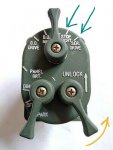Cataclysmx
Member
- 12
- 33
- 13
- Location
- California
Hello everyone I am new here! Sunday is the day I may be buying myself a 1970 Kaiser m35a2 and I am quite nervous and excited for this adventure. To give a little background I have dreamed about owning one of these machines and finally have an opportunity to acquire one. I am not super knowledgeable when it comes to these vehicles however basic car and truck maintenance comes pretty easy to me. I love learning new things and think this would be a great opportunity to learn more about these trucks. So today I had a few questions for everyone in here. 1. What should I expect with this purchase? There are 29k miles reported on the odometer and it starts right up no problem. It’s approximately 4 hours away from me and I’m stressing about the drive home.
2. What are some things I should inspect/test when I arrive to see the truck?
3.what advice do you all have for a younger guy purchasing one of these vehicles?
I really appreciate any help or advice I can get, thank you! Attached below are some photos of the vehicle.
2. What are some things I should inspect/test when I arrive to see the truck?
3.what advice do you all have for a younger guy purchasing one of these vehicles?
I really appreciate any help or advice I can get, thank you! Attached below are some photos of the vehicle.
Attachments
-
161.1 KB Views: 37
-
338.5 KB Views: 37
-
154.5 KB Views: 34
-
270 KB Views: 32









